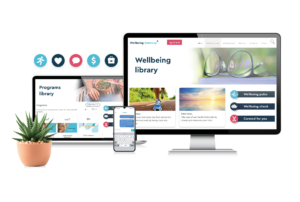Good sleep, nutrition, regular exercise, avoiding substances and stimulants, mindfulness, and much more all contribute to physical wellbeing.
There are many benefits to improving and maintaining your physical wellbeing including reducing stress levels and the risk of chronic disease, stronger bones and muscles, increased energy levels, improved sleep and mental health, and longer life expectancy.
However, according to the Australian Bureau of Statistics:
- Almost one in four (23.9%) people aged 15 years and over met the physical activity guidelines.
- Nearly half (46.9%) of employed adults aged 18–64 years described their day at work as mostly sitting With so many factors contributing to your overall physical wellbeing, it can be overwhelming to know where to start.
The good news is, a few small changes can have a big impact.
Here are five small changes you can make today to improve your physical wellbeing.
1. Get your heart pumping
It is recommended that adults do up to 5 hours of moderate intensity exercise or 2.5hours of vigorous intensity exercise a week (or a combination of the two).
Try to factor in 30 minutes of exercise per day – brisk walking, jogging, Pilates, yoga, dance class, a round of golf, swimming, cycling or weightlifting.
Keep it interesting and find something you enjoy so you don’t get bored!
2. Fuel your body
What we eat has a huge impact on our energy levels, productivity, and mood.
A balanced diet is key to fuelling your body, to get the most out of it.
Use the rule of ‘everything in moderation’ – eat plenty of fruit and vegetables, protein, healthy fats and wholegrains.
Avoid excessive consumption of food or drink that is high in saturated fats, salt and sugar but don’t feel guilty when you do eat these – it’s all about balance.
3. Enjoy some shut-eye
A good night’s sleep is essential for your overall wellbeing.
Most adults need 7-9 hours sleep each night and children requiring more. Create a night-time routine to help your body wind down.
Avoid sugary and caffeinated drinks, take a warm shower, limit screen time before bed, dim the lights, and practice meditation or mindfulness.
This will signal to your body that you’re getting ready for sleep and will help you fall asleep faster, and improve your sleep quality.
4. Have some ‘me’ time
Mental and physical wellbeing are intrinsically linked and impact one another.
It’s just as important to exercise your body, as it is to look after your mind.
Take time out for yourself regularly to look after your mental wellbeing.
Self-care looks different for everyone and should change depending on what you need – some days it might be getting a massage, facial or taking a relaxing bath, it might be reading a good book or watching a movie, it could be going for a long walk or getting some exercise, it might be catching up with friends or family for more social connection.
5. Avoid substances and stimulants
The use of tobacco, excessive alcohol intake, drug use, and the over-consumption of caffeine and sugar can negatively affect your physical health and overall wellbeing, raising the risk of chronic diseases and various health issues.
If you’re seeking assistance to cut down on or quit these substances and stimulants, there is a wealth of resources available.
Something on your mind?
If you require counselling, coaching or support, our clinicians are available to help.
Call, chat or request an appointment online.
Looking for more resources?
Register for Wellbeing Gateway. Your personalised mental health and wellbeing companion.

